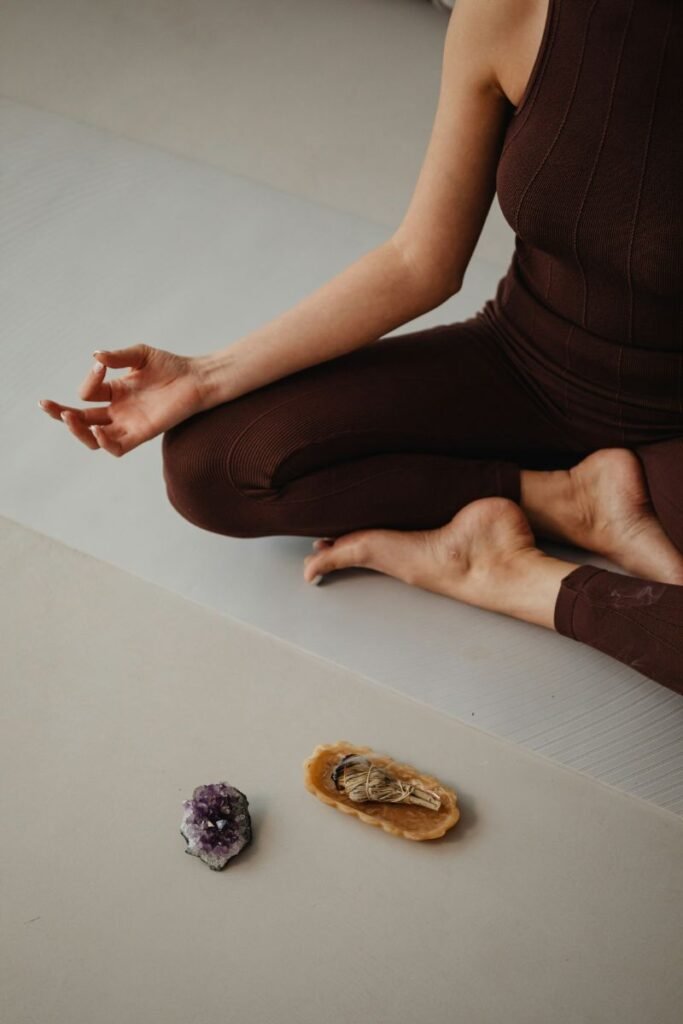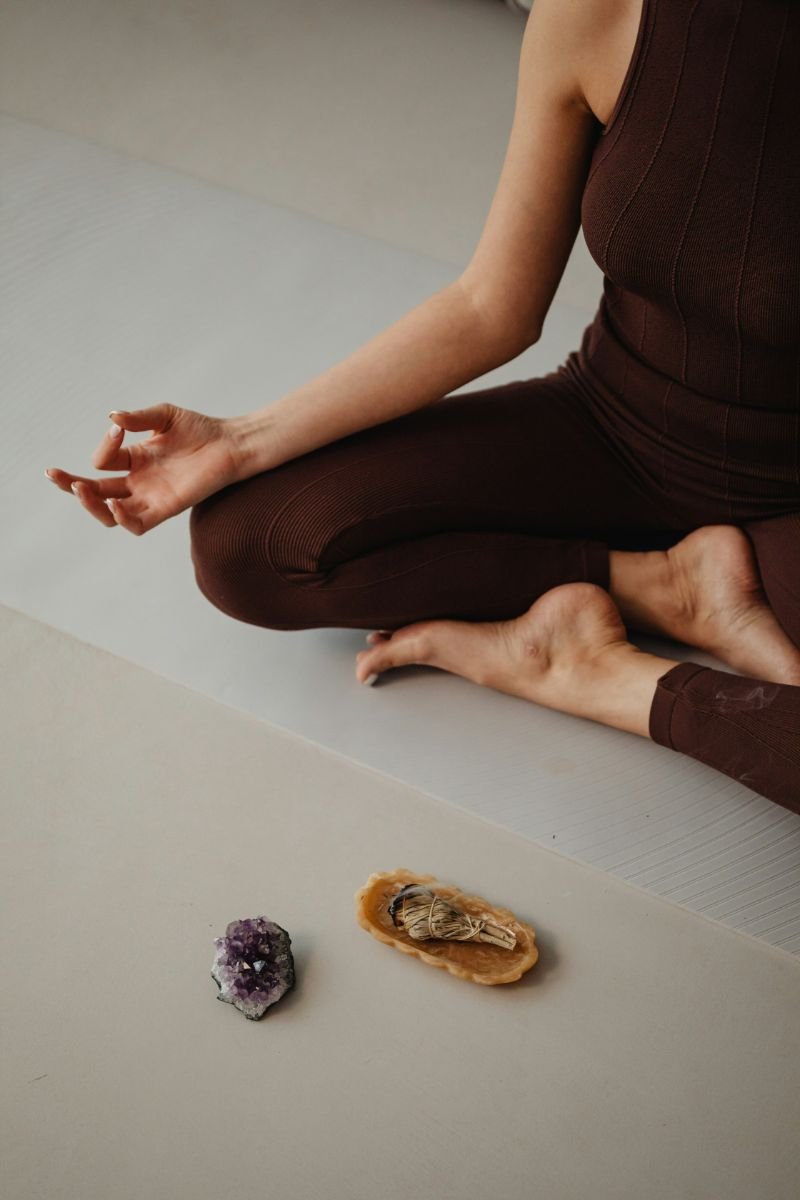How Meditation Reduces Stress: A Simple Guide
If you’re feeling stressed out, meditation may be just what you need to calm your mind and find some inner peace. Meditation is a mind-body practice that has been used for thousands of years to promote relaxation and reduce stress. It involves focusing your attention on a particular object, thought, or activity to help you achieve a state of mental clarity and calmness.
Studies have shown that meditation can be an effective tool for reducing stress and anxiety. When you meditate, you activate your body’s natural relaxation response, which can help lower your heart rate, breathing rate, and blood pressure. This can help you feel more relaxed and less anxious, even in the midst of a stressful situation. Additionally, regular meditation practice can help you develop greater self-awareness and emotional resilience, which can help you better cope with stress over time.
Understanding Stress and Meditation

The Science of Stress
Stress is a natural response of the body to any situation that requires a response or adjustment. It is a part of our survival mechanism that prepares us to face challenges. However, chronic stress can lead to various health problems, including anxiety, depression, and cardiovascular diseases.
When you experience stress, your body releases stress hormones, such as cortisol and adrenaline, that increase your heart rate, blood pressure, and breathing rate. This response is known as the “fight or flight” response, which prepares you to either confront the stressor or run away from it.
Basics of Meditation for Stress Relief
Meditation is a technique that has been used for centuries to calm the mind and reduce stress. It involves focusing your attention on a specific object, such as your breath, a sound, or a visualization. Meditation helps to activate the relaxation response, which is the opposite of the “fight or flight” response.
Research has shown that meditation can reduce the symptoms of stress and anxiety by lowering the levels of stress hormones in the body. Meditation can also help to improve your mood, increase your sense of well-being, and enhance your cognitive function.
To get started with meditation, find a quiet and comfortable place where you won’t be disturbed. Sit in a comfortable position with your back straight and your eyes closed. Focus your attention on your breath and try to let go of any thoughts or distractions that come to your mind. You can start with just a few minutes of meditation each day and gradually increase the duration as you become more comfortable with the practice.
In conclusion, meditation is a simple and effective way to reduce stress and improve your overall well-being. By practicing meditation regularly, you can learn to manage your stress levels and maintain a sense of calm and relaxation in your daily life.
Practical Meditation Techniques

If you’re looking to reduce stress through meditation, there are several techniques you can try. Here are a few popular options:
Mindfulness Meditation
Mindfulness meditation is a popular technique that involves focusing on your breath and bringing your attention to the present moment. This technique can help you become more aware of your thoughts and feelings, and can help you develop a greater sense of calm and relaxation.
To practice mindfulness meditation, find a quiet place where you won’t be disturbed. Sit down in a comfortable position and close your eyes. Take a few deep breaths, and then begin to focus on your breath. As you inhale, feel your chest and stomach expand. As you exhale, feel your chest and stomach contract. If your mind begins to wander, simply bring your attention back to your breath.
Focused Meditation
Focused meditation is another technique that can help reduce stress. This technique involves focusing your attention on a particular object, such as a candle flame or a mantra. Focused meditation can help you develop greater concentration and focus, which can be helpful in reducing stress.
To practice focused meditation, find a quiet place where you won’t be disturbed. Sit down in a comfortable position and choose an object to focus on. It could be a candle flame, a mantra, or anything else that you find calming. Simply focus your attention on the object, and if your mind begins to wander, bring your attention back to the object.
Movement-Based Meditation
Movement-based meditation is a technique that involves combining meditation with physical movement. This technique can be helpful for people who find it difficult to sit still for long periods of time. Movement-based meditation can help you develop greater awareness of your body, and can be helpful in reducing stress.
To practice movement-based meditation, choose a physical activity that you enjoy, such as yoga or tai chi. As you move, focus your attention on your body and your breath. Pay attention to how your body feels as you move, and if your mind begins to wander, simply bring your attention back to your breath and your body.
By trying out these different meditation techniques, you can find the one that works best for you and start experiencing the benefits of reduced stress and greater relaxation.
Benefits of Meditation on Stress Reduction
If you’re looking for a way to reduce stress, meditation might be just what you need. Here are some of the benefits of meditation on stress reduction:
Cortisol and Stress Hormones
Meditation has been shown to reduce the levels of cortisol and other stress hormones in the body. Cortisol is a hormone that is released in response to stress, and high levels of cortisol can lead to a number of health problems, including anxiety, depression, and weight gain. By reducing cortisol levels, meditation can help to reduce stress and improve overall health.
Improving Resilience to Stress
Meditation can also improve your resilience to stress. When you meditate regularly, you learn to focus your attention and become more aware of your thoughts and emotions. This increased awareness can help you to identify when you’re feeling stressed and take steps to reduce it before it becomes overwhelming.
Long-Term Effects on Wellbeing
In addition to reducing stress in the short-term, meditation can also have long-term effects on your overall wellbeing. Studies have shown that regular meditation can lead to improvements in mood, increased feelings of happiness and well-being, and a greater sense of calm and relaxation.
Overall, meditation is a powerful tool for reducing stress and improving your overall health and wellbeing. By reducing cortisol levels, improving your resilience to stress, and promoting long-term feelings of happiness and relaxation, meditation can help you to live a healthier, happier life.
Incorporating Meditation into Daily Life

Meditation is a simple and effective way to reduce stress in your daily life. With regular practice, you can experience a sense of calm and relaxation that can help you cope with the challenges of daily life. Here are some tips on how to incorporate meditation into your daily routine:
Set a Regular Time for Meditation
Choose a time of day when you can meditate consistently. This could be in the morning, during your lunch break, or before bed. Setting a regular time for meditation can help you establish a routine and make it easier to stick with your practice.
Find a Quiet Place to Meditate
Find a quiet place where you won’t be disturbed during your meditation practice. This could be a spare room, a quiet corner of your home, or even outside in nature. Make sure the space is comfortable and free from distractions.
Start with Short Sessions
When you’re first starting out, it’s best to start with short meditation sessions. You can gradually increase the length of your sessions as you become more comfortable with the practice. Start with just five minutes a day and gradually increase to 10 or 15 minutes.
Use Guided Meditations
If you’re new to meditation, using guided meditations can be helpful. There are many apps and websites that offer guided meditations for free. These can help you stay focused and provide guidance on how to meditate.
Practice Mindfulness Throughout the Day
Meditation doesn’t have to be limited to a specific time or place. You can practice mindfulness throughout the day by paying attention to your breath, your thoughts, and your surroundings. This can help you stay present and reduce stress in your daily life.
Incorporating meditation into your daily routine can be a simple and effective way to reduce stress and improve your overall well-being. With regular practice, you can experience a greater sense of calm and relaxation that can help you cope with the challenges of daily life.






